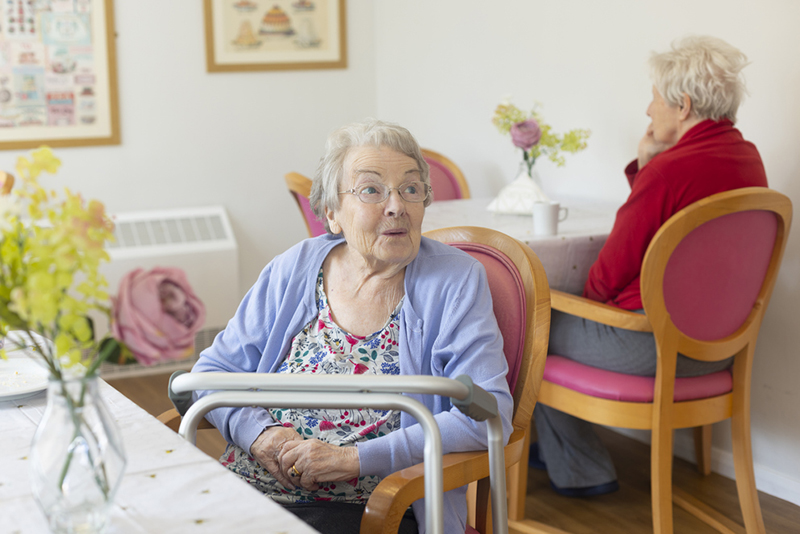
As carers, how do you know when it’s the right time to move a parent or loved one into care? Whilst the right time to move into care will depend on each person and their individual care needs, there are many signs to look for that indicate they may benefit from moving into care. To help support you to make the right decision for yourself and your loved one, we’ve put together this guide which lays out; the signs to look out for, how to decide on your loved one’s care and how to approach moving into a care home.
Recognising the signs that someone needs to move into care
One of the most significant challenges carers face is recognising the initial signs that a loved one should consider moving into care. There are many signs to look out for, particularly if they have dementia, and these could be from small changes to much more significant signs. To help give you more of an idea of what to look out for, we’ve highlighted some of the most common signs that indicate your loved one may benefit from moving into care.
They’re struggling with day-to-day tasks
A common sign that a loved one may need to move into care is if they’re struggling with daily tasks. This might start with something small like misbuttoning a shirt or forgetting to do up shoelaces, but it can quickly become a significant problem. Even something as simple as forgetting to tie your shoes could cause a fall, resulting in an injury that requires the support of a care professional. It’s easy to overlook smaller day-to-day struggles, especially if, at first, they don’t happen consistently. However, it’s important to be aware of the signs that your loved one is struggling and recognise whether their struggles were isolated incidents or are frequently happening.
Some examples of day-to-day tasks that might become difficult to manage include:
1. Maintaining the cleanliness of their home. If you notice your loved one’s home isn’t looking as well-kept as usual e.g. dishes piling up, out-of-date food in the fridge and messy garden areas, this could be a sign they’re struggling to maintain their space and could benefit from extra support.
2. Preparing meals for themselves. Having difficulties preparing meals for themselves is another sign that your parent or loved one could need care support, particularly if they were previously passionate about cooking for themselves.
3. Maintaining their personal hygiene. This could include anything from washing, bathing and brushing their teeth to getting themselves dressed each day. If you notice that your loved one is looking less like themselves, this might be a sign they need help and assistance.
4. Deciding what to wear. It may be that your loved one struggles to get dressed every day because they find it difficult to remember how to put their clothes on and in what order to put them on. This, again, could start with something small like a misbuttoned shirt but could progress very easily.

They’ve been diagnosed with a medical condition or syndrome
A diagnosis of a specific medical condition or syndrome could be the most significant indicator that your parent or loved one is ready to move into a care home. Certain medical conditions may be managed more easily with medication. Whilst others, such as dementia, will worsen over time, increasing the amount of support that’s needed along with it. If your loved one has recently received a dementia diagnosis, or you believe that they might be showing the signs of dementia, it could be the right time to consider the different care options available to you both.
Some signs of dementia to look out for include:
– Memory loss
– Difficulties carrying out day-to-day tasks
– Finding it hard to follow and concentrate on conversations
– Feeling confused about dates, times and places
– Experiencing mood swings and changes
For more information on how to support your loved one with their dementia diagnosis, as well as advice on choosing a care home, visit our resources and advice page.
They’re less interested in friends or hobbies
Whilst this may seem like a significantly smaller warning sign compared to others, a lack of interest in hobbies or friends is an important sign to look out for. If your loved one is losing interest in their hobbies, or is no longer spending quality time with friends, this could cause depression and long-term health conditions in older people. Keep an eye on this by asking your loved ones about what they’ve been up to recently. If you notice they’re no longer talking about having coffee with friends, spending time outdoors or enjoying their favourite hobbies, it could be a telltale sign they’re struggling and may need more support.
Assessing your loved one’s care needs and requirements
If you suspect your loved one is showing signs that it might be time to move them into a care home, the next step is to assess their needs and requirements. To do this, you should contact the social services department of your local council and speak to them about organising a care needs assessment.
What is a care needs assessment?
A care needs assessment involves a social care professional visiting you and your loved one to analyse their health and capabilities. The assessment is usually carried out at your loved one’s home and will consist of a few questions about the following:
1. Your ability to carry out day-to-day tasks
2. What struggles you currently have e.g. mobility issues
3. What care you’re receiving at the moment
4. Your current living arrangements
5. Your support network e.g. family, friends

What happens after the needs assessment?
Once your assessment is complete, your local council will make a decision about your care and whether you’re eligible for care support. If you’re eligible for care, your local council will work with you to create a care plan that meets your needs and requirements. They will also recommend the type of care you might need e.g. an at-home carer, full-time care in a home, or sheltered accommodation.
For more information about needs assessments and how to organise one for your loved one, visit our resources and advice page.
Making a decision about someone’s care
When deciding on a loved one’s care, it’s best to have an open discussion with them about their needs, requirements and what options are available to them. Whilst a needs assessment will highlight what care is best for your loved one, they may not want to go ahead with the suggested care plan, particularly if it involves moving out of their home. To help support you to make the best decision for your loved one, we’ve laid out the different care options available and how to make a decision about care when your loved one isn’t able to.
Exploring the different care options
There are many different options available when it comes to care and, depending on your needs and the recommendations of your local authority, one option may better suit you than another. The best way to approach your next steps is to sit with your loved one to discuss their options, taking into consideration the recommendations from your needs assessment. You may find that, for now, at-home care is best suited for you. However, if your local council has suggested a move into care, here are a few options to explore.
1. Respite Care – This is a short-term care option that involves your loved one moving into care to give their carer a break from full-time care. If you’re considering moving into care, but aren’t sure if it’s right for your loved one, this is a great way to test it out.
2. Emergency respite care – Similar to respite care, this is a more urgent option that’s suited to anyone whose loved one needs care support quickly.
3. Dementia Care – This type of care is tailored to support the needs of people living with dementia. If your loved one has been diagnosed with dementia, a dementia-friendly care home would be the best option for them in the long term.
For further advice on how to support a loved one with dementia, read our guide to living well with dementia.

Who makes the decision?
If your loved one is capable of making a decision about their own care for themselves, then they should decide what’s best for their needs. However, if your parent or loved one has a medical condition, or syndrome, that has left them unable to make decisions about care for themselves, then you may have to decide for them. If you’re in a position where you will have to decide on whether or not to move your loved one into care, here’s everything you need to consider.
Do you have lasting power of attorney?
A lasting power of attorney is a legal document that allows you to appoint someone to assist you in making decisions with you or on your behalf. This is a particularly important document to have in place for situations where you are unable to make your own decisions. If you have lasting power of attorney for your loved one, then you can make the final decision based on what you believe is the best care for them.
The outcome of your needs assessment
A needs assessment is the best indication of what your next steps should be. If your local council has recommended moving your parent or loved one into care, then this should be taken on board when it comes to making a final decision. If your local council hasn’t recommended moving into care, but you believe the best option is to move into care, you can ask for a review of the decision.
For more information on organising a power of attorney, visit the gov.uk website.
Discover the care home for you and your loved one
Whilst knowing when to move into care can be difficult, we hope we’ve been able to offer the support you need to make the best decision for you and your loved one. To find further support with moving into care, including how to fund your care, head to our resources and advice section.
To learn more about what life across our dementia-friendly homes looks like, follow us on Twitter, Facebook, Instagram and LinkedIn.








